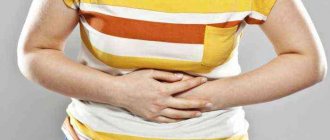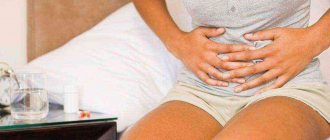Nausea and vomiting during menstruation
It is no secret that for each individual woman, critical days proceed in their own way, not like other representatives of the fair half of humanity, which is due to the individual characteristics of her body, which determine the duration of menstruation, the daily volume of discharge, and well-being during menstruation. However, there are a number of problems that any woman faces, regardless of age, lifestyle and health status. Nausea and vomiting during menstruation, too heavy or, on the contrary, scanty periods, unreasonable increase/decrease in the intermenstrual interval - the occurrence of such problems can be caused by hormonal imbalances, the onset of pregnancy or menopause, premenstrual syndrome.
Of course, it will not be difficult for an experienced gynecologist to identify the cause of such changes based on the patient’s complaints and the results of her tests, but making a correct diagnosis is made difficult by the fact that many women skip routine examinations with a doctor and are in no hurry to seek help from a specialist if alarming symptoms arise, in particular, nausea and vomiting during menstruation. This position is fraught with various kinds of complications, so doctors remind: any change in the established menstrual cycle is a reason for a visit to the gynecologist, because the sooner the cause of the deviation is diagnosed, the higher the chances of its elimination without serious consequences for health. Further in the article, we will go into detail about why vomiting and nausea occur during PMS, what reasons there may be if during menstruation you often feel sick and nauseous. Also important is the question of how to treat such painful symptoms, what to do to get rid of nausea and vomiting during menstruation.
Help with severe pain
The first thing a girl should do when experiencing sharp pain is to relax. It is advisable to lie down and provide your lungs with fresh air. You should take a pain reliever. When, in addition to nausea, there is an increase in temperature, it is necessary to reduce it using anti-inflammatory drugs. For pain, take antispasmodics - tablets that reduce muscle spasms, or analgesics.
If nausea persists, the gynecologist may prescribe a drug to balance hormonal imbalances during the menstrual cycle. This period is characterized by low blood clotting, operations are prohibited.
If a woman did not experience discomfort during menstruation, or the pain began suddenly, consultation with a specialist is necessary. The doctor will order tests and determine the cause.
Source
Author Maria Semenova Reading time 9 min. Published 12/24/2017
Menstruation is quite a stressful time for the female body, during which strong hormonal changes occur.
All this is accompanied by unpleasant symptoms that can cause nausea and dizziness, and mood swings. For what reasons does nausea develop during menstruation, what should you do and how to help yourself?
Causes of nausea and vomiting during menstruation
Nausea and vomiting, a feeling of nausea, as if sick, that occur on the eve of and during menstruation can be a consequence of:
1 premenstrual syndrome or PMS (in this case, the woman also experiences symptoms such as swelling, bloating, pimples and acne on the face and torso, increased sensitivity of the breasts, swelling of the mammary glands, pain in the lower abdomen, radiating to the lower back, increased sensitivity to odors, headache);
2 fluid retention in the body can cause nausea and nausea during menstruation;
3 high intracranial pressure and nausea during menstruation (associated symptoms - a feeling of squeezing, fullness in the skull, pain that increases with walking and sudden movements, a feeling of pulsation in the eyes and ears, pallor of the skin, dizziness, in rare cases - loss of consciousness);
4 increase in the concentration of serotonin in the cerebrospinal fluid;
5 the anatomical structure and location of the uterus (in some women, the uterus is slightly deformed and tilted back, resulting in compression of the nerve endings, causing nausea and vomiting, bloating, pain in the lumbar and sacral spine);
6 hormonal imbalance can cause not only nausea, but also vomiting (imbalance of progesterone and prostaglandins, accompanied by frequent mood swings, increased appetite and sweating, skin rashes);
7 excessive physical activity, lifting weights (experts recommend either completely abandoning physical activity during menstruation, or adjusting the training regimen in such a way as to reduce the load on the abdominal muscles and spine);
8 taking oral contraceptives, or rather, incorrect selection of hormonal oral contraceptives can cause nausea and other painful symptoms and side effects;
9 acute intoxication of the body due to excessive consumption of alcoholic beverages, poor-quality food, expired medications;
10 pregnancy (embryo implantation is often accompanied by the release of a small amount of blood from the vagina, which is mistaken for menstruation);
11 ectopic or frozen pregnancy;
12 spontaneous termination of pregnancy in the early stages;
13 exacerbation of gastrointestinal diseases (in this case, in addition to nausea and vomiting, “hungry” pain and a burning sensation in the stomach, sour belching, and bad breath may be observed);
14 inflammation of the uterine appendages and nausea during PMS (with acute adnexitis, a woman may suffer from nausea, vomiting, unbearable pain in the lower abdomen, fever, indigestion, abdominal bloating, migraine, fluctuations in blood pressure, dizziness, chills);
15 dysmenorrhea (pain during menstruation, resulting from congenital or acquired defects of the reproductive organs, inflammatory process in the pelvic organs, uterine deformation, constant stress or diseases of the central nervous system).
Prevention
If the ailments are mild, the discomfort goes away immediately after menstruation, the woman does not vomit, the cycle is stable and menstruation occurs regularly, you can smooth out the unpleasant sensations or get rid of them completely with the help of meditation, light herbal sedatives, and gentle massage. It is more difficult to combat poor health during the period of CD, so it is easier to take preventive measures and the sooner this is done, the higher the likelihood of getting rid of ailments:
- Heavy physical activity should be limited: strength training, crossfit will wait until better times, now yoga and walking are relevant. Even professional athletes often take time out during their period, so as not to provoke unpleasant consequences.
- Controlling the flow of fluid into the body: clean water, weak herbal tea, fruit juice will come in handy, but coffee should be limited when you feel sick and have your period. Very often, the reason for fluid retention in the body is precisely the lack of its supply from the outside. In this way, the body makes it clear that there is a shortage of water and it does not intend to part with it.
- Follow the rules of a healthy diet: spicy, salty and fatty foods can provoke a severe attack of nausea, food should be light, portions should be smaller, and meals should be taken more often. Vegetables and fruits rich in vitamins and fiber, high-quality protein and complex carbohydrates provide a feeling of fullness and should form the basis of the diet. A minimum of simple carbohydrates in the form of baked goods, bread and desserts. Less sugar and salt, more healthy herbs and aromatic spices.
- Avoid alcohol: when it enters the body, all systems react, blood pressure rises, which can cause headaches, vomiting and dizziness. Moreover, alcohol provokes fluid retention and causes a feeling of puffiness.
- There is no need to plan a visit to the bathhouse or sauna for these days. High temperatures and humidity are now strictly contraindicated: negative consequences are possible in the form of an increase in the volume of discharge and bleeding, dizziness, nausea and even vomiting during menstruation, especially in the first days.
- Don’t forget about proper rest: the body needs restful sleep no less than proper nutrition and healthy activity. With regular lack of sleep, hormonal balance is disrupted, blood sugar levels change, and the body reacts more sharply to stress and nervous stimuli.
- Spend time with pleasure and benefit. What can better distract from bad thoughts and relieve nervous tension? For some it’s a walk with friends, shopping, relaxing with family or watching a favorite movie, for others it’s time alone with their thoughts, an interesting book or knitting. It is important that this time is spent beneficially for the body and mental balance.
- Don't forget about vitamins and healthy fats. Magnesium and vitamin E are especially important now, which are found in sufficient quantities in bananas, avocados and dried apricots. You can treat yourself to dark chocolate, which perfectly improves your mood.
- Maximum comfort: comfortable comfortable clothes, no heels, natural materials instead of synthetics may not save you from attacks of nausea, but they will definitely improve your mood and overall well-being.
We recommend reading: General analysis of ESR. What is ESR in a blood test and what can an increased or decreased level of the indicator indicate?
If preventive measures only slightly alleviate women’s suffering, then complex treatment with drugs is necessary. After all, the body can still withstand a short-term attack of nausea, but malaise from the first to the last days of menstruation is not an easy test.
Having found out why you may feel sick during menstruation, the doctor will prescribe a set of medications and advise, if necessary, to be observed by specialists if the nausea is associated with an exacerbation during menstruation of problems with the gastrointestinal tract, urological problems or hormonal ones.
For symptoms of PMS and painful sensations during menstruation, painkillers and, if necessary, antipyretic drugs are prescribed; nervous disorders and nausea are treated with sedatives and, less often, hormonal drugs; for some specific gastrointestinal reactions, antacids are used.
It is important to understand that, according to statistics, a woman who monitors her diet and lifestyle is active and emotionally stable, undergoes examinations by a gynecologist on time, and more easily tolerates unpleasant symptoms before menstruation. That is why it is so necessary to devote time to yourself and your health, to be able to push problems into the background at least for a short time and fully restore your internal balance. Nature has endowed a woman with special harmony, and to maintain this comfort, it is so important to learn to be in balance with yourself.
For symptoms of PMS and painful sensations during menstruation, painkillers and, if necessary, antipyretic drugs are prescribed; nervous disorders and nausea are treated with sedatives and, less often, hormonal drugs; for some specific gastrointestinal reactions, antacids are used.
What to do if you feel very nauseous, feel sick, or vomit during menstruation (menstruation), treatment
In what cases does a woman urgently need to see a specialist if she has severe nausea during her period? According to doctors, you should not postpone a visit to the gynecologist if:
1 nausea and vomiting are accompanied by unbearable pain in the genital area, which does not go away over time, but, on the contrary, intensifies (may indicate appendicitis, apoplexy (rupture of the membrane) of the ovary, peritonitis);
2 the volume of menstrual flow has increased several times compared to previous periods;
3 there is a suspicion of the presence of an inflammatory process in the pelvic organs (characteristic symptoms are high body temperature, fever, chills, sweating, nausea leading to vomiting, severe pain in the lower abdomen, localized from the right or left appendage);
4 showed symptoms of a sexually transmitted infection (copious vaginal discharge with an unpleasant odor and a purulent/mucous/cheesy consistency, itching and burning in the genital area, rash in the genital area, suspicious plaque on the labia, pain during urination and defecation).
Nausea as a sign of pregnancy
In some cases, the appearance of nausea during menstruation may be a consequence of a woman's pregnancy. In this case, the woman may experience false periods. Thus, a woman may not be aware of the development of pregnancy, she may experience bleeding from the vagina, as during menstruation, nausea, weakness, which can easily be confused with signs of the development of menstruation.
In this case, to make sure that the causes of nausea during scanty periods are not signs of pregnancy, it is recommended to take a pregnancy test. It is especially important to pay attention to the appearance of nausea during menstruation in cases where it appears for the first time. If a woman has never had a feeling of nausea or nausea during the development of menstruation before this moment, then the exact cause of this problem should be found out.
What to do, how to get rid of nausea and vomiting during menstruation, during menstruation
If the critical days are accompanied by mild nausea that does not turn into vomiting, then moderate physical activity (yoga, walking in the fresh air), adequate sleep and a change in diet (preference should be given to foods high in calcium and magnesium - legumes) will help get rid of it , sesame seeds, poppy seeds, nuts, seaweed, peaches, apricots, broccoli, rose hips, cauliflower, citrus fruits, seafood, cereals, carrots, dried fruits, sprouted wheat seeds, cocoa, natural chocolate). Of the medications used to eliminate nausea during menstruation, the most popular are drugs that provide antispasmodic (“Drotaverine”, “Spazmolgon”, “Papaverine”, “No-shpa”, etc.) and anti-inflammatory (“Ibuprofen”, “Paracetamol”, etc.). ) effect, as well as antacids. If there are indications, the doctor may prescribe drugs that normalize hormonal levels, for example, “Mastodinon” - a drug based on an extract from twigs. If nausea and vomiting during menstruation are caused by an infectious disease, then their elimination is achieved by taking antibiotics, selected individually.
It should be noted that the use of any medications must be agreed with a specialist. If nausea and vomiting during menstruation are caused by inflammation of the appendix (appendicitis), abdominal walls (peritonitis) or rupture (apoplexy) of the ovary or fallopian tube, painkillers taken to eliminate unpleasant symptoms will make it difficult to make a correct diagnosis, which can lead to death due to untimely provision of medical care. To avoid such developments, do not forget to visit a gynecologist regularly (once every six months in the absence of complaints, once a quarter in the presence of chronic diseases) and do not delay a visit to a specialist if your critical days are accompanied by nausea and vomiting, coupled with fever, high fever, weakness and pain in the lower third of the abdomen.
Vomiting during menstruation, causes of vomiting and gagging during menstruation
Nausea and vomiting often accompany the first weeks of pregnancy, but if you are not pregnant, these symptoms may be due to hormonal imbalance. It is difficult to find a woman who does not know what premenstrual syndrome is - a condition characterized by mood swings, swelling, breast tenderness and nausea.
This is due to changes in the level of hormones such as progesterone and estrogen before the onset of menstruation and during ovulation. As a result, fluid retention occurs in the woman’s body, intracranial pressure increases, nausea and vomiting appear. In addition, other hormones - prostaglandins - also affect the deterioration of well-being. Their production coincides with the beginning of menstruation. Nausea and vomiting during menstruation, provoked by hormonal imbalance, in most cases are their “merit.” Prostaglandins:
1 promote vasodilation;
2 worsen blood clotting ability;
3 give hardness to the muscles;
4 negatively affect the functioning of the nervous system;
5 I provoke the appearance of uterine pain;
6 interfere with the full production of gastric juice.
It is the last point that affects the appearance of vomiting during menstruation. For example, if a woman eats too salty or spicy food these days, her body reacts to this with a feeling of nausea. That is why women should adhere to a healthy lifestyle during menstruation. There is another hormone that can provoke nausea and vomiting even in absolutely healthy women. This is serotonin - a hormone that is synthesized in the brain. When there is an excess of it in a woman’s body, fluid retention occurs, resulting in intracranial edema. This is what causes the feeling of nausea, vomiting and dizziness.
As a rule, hormonal imbalance is observed in those women who adhere to a strict diet, lose weight sharply, live in constant stress and take certain medications. This condition must be treated by contacting a competent specialist. In addition to hormonal causes of vomiting during menstruation, there are also physiological ones, which any woman can cope with at home.
Diagnosis of algomenorrhea, what does it mean?
If a woman constantly feels sick during her period, and at the same time has pain in her stomach or lower back, then based on these complaints, the doctor makes a diagnosis of algomenorrhea.
Primary algomenorrhea is diagnosed in cases where the doctor discovers disturbances in the outflow of blood from the uterus due to the specific anatomy of its structure (most often due to underdevelopment of this genital organ or its incorrect location). This problem manifests itself during the very first menstruation in a girl’s life.
The disease is treated with hormonal therapy, but if symptoms are mild, they may go away after childbirth. And the second part of women simply gets used to the inconveniences that accompany them throughout their lives during menstruation.
However, if your attending physician is lucky enough to find the root cause of pain, nausea, etc., then treatment is possible, but if it cannot be found, then at least it can be calmed down with the help of medications. But only a doctor can prescribe appropriate treatment; do not try to treat yourself.
Secondary algomenorrhea is diagnosed as a consequence of gynecological diseases. Each of which (endometriosis, adhesions, fibroids, etc.) requires active drug intervention and individual treatment.
Vomiting and diarrhea, frequent loose stools during menstruation, causes
Nausea is a rather unpleasant phenomenon, however, if it is also accompanied by upset bowel movements with severe pain in the abdomen, then the woman’s condition becomes truly unbearable. This is a reason to seek medical help. If such a disorder is isolated, then most likely you have food poisoning that coincides with the onset of menstruation. However, when this condition occurs monthly, it may indicate gynecological problems. Such diseases can be treated, but first you should consult a doctor to carry out a series of diagnostic measures and identify the cause of the pathology.









